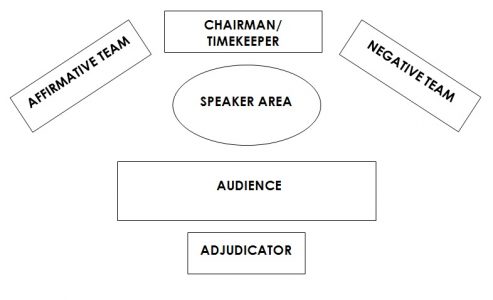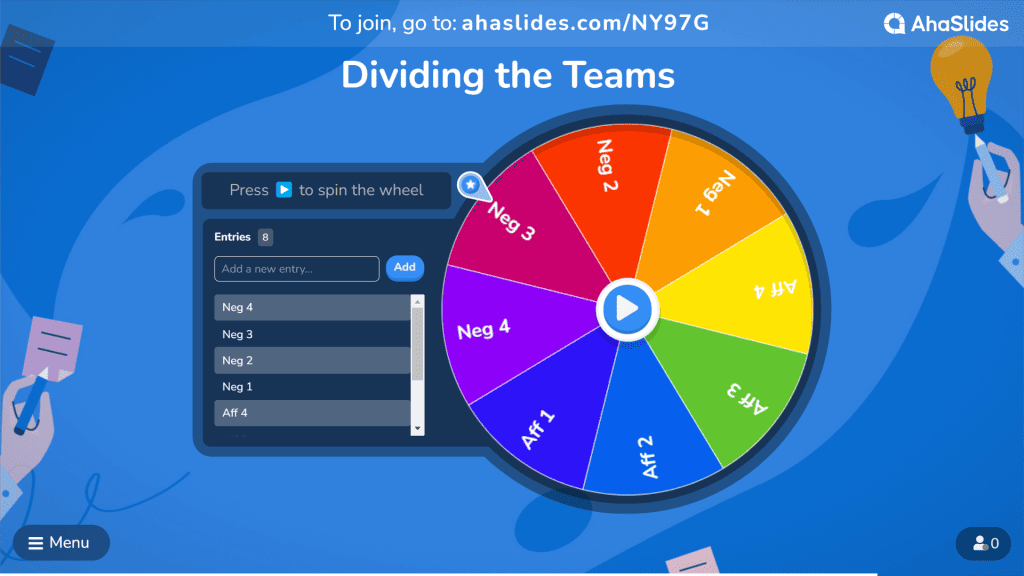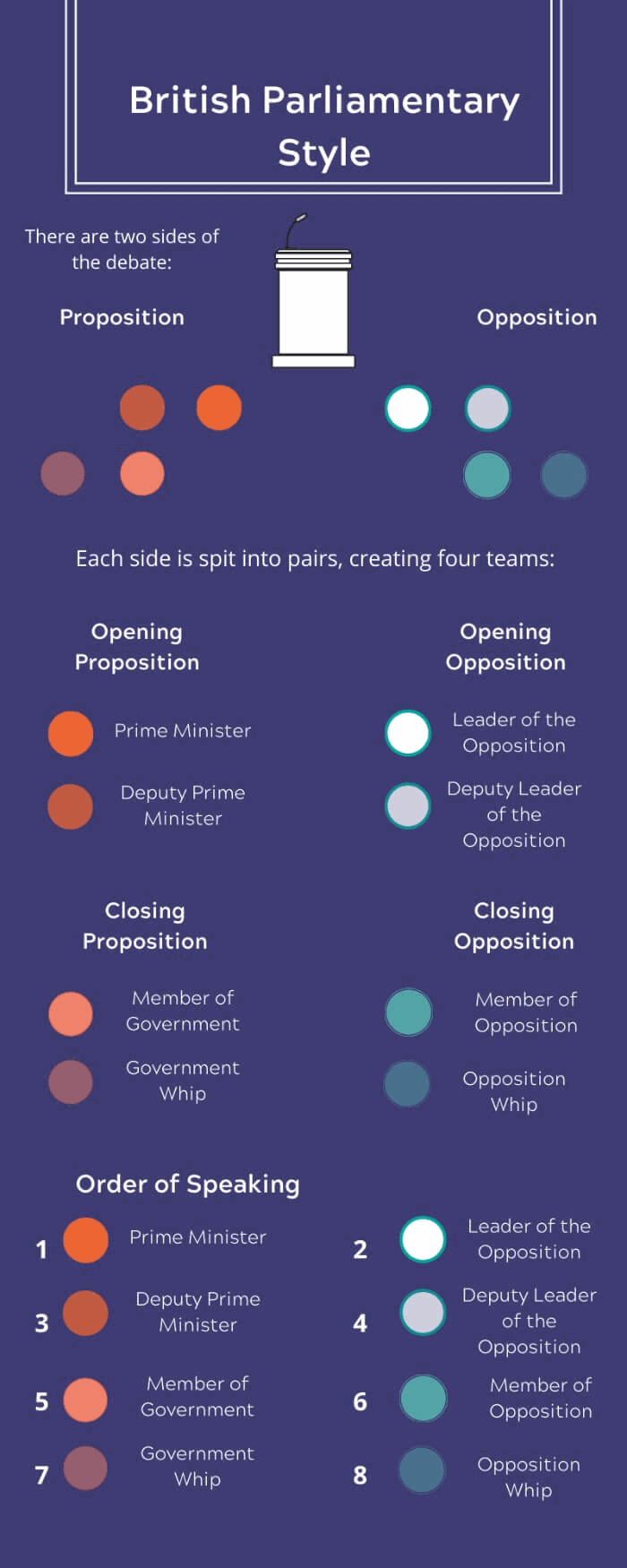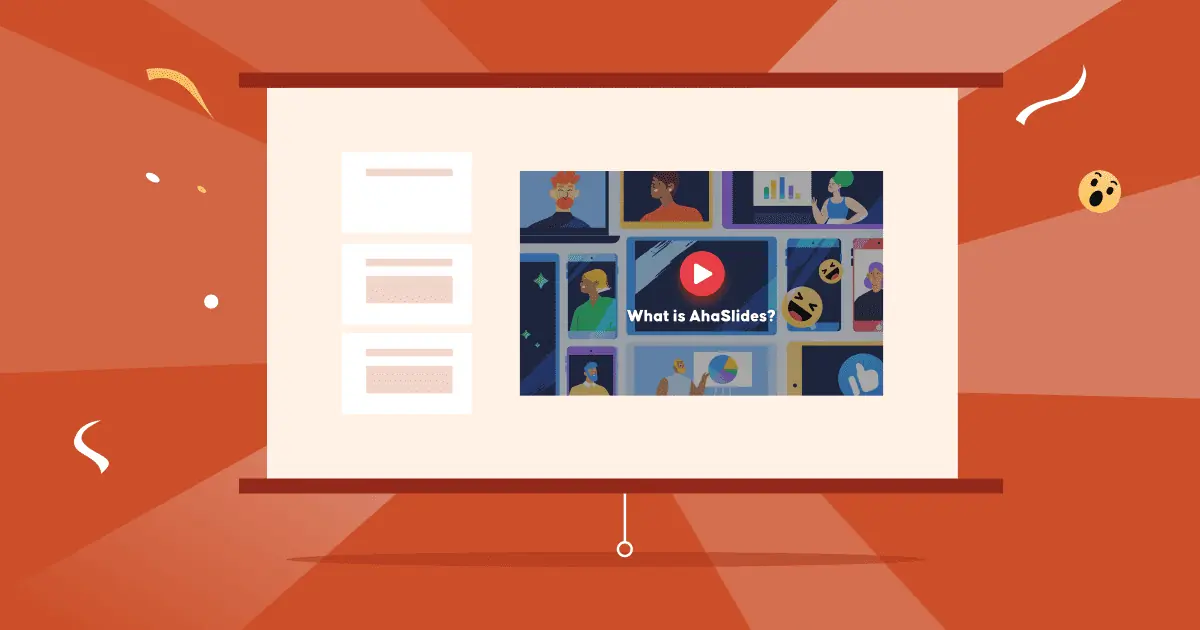Як весці дэбаты пачаткоўцам? Спрэчкі — гэта вельмі, вельмі сур'ёзная тэма. Калі вы ніколі раней не сварыліся спрэчак, вам можа быць цяжка падумаць пра тое, што адбудзецца і як пазбегнуць таго, каб выглядаць абсалютна неразумным перад усімі.
Шмат чаму трэба навучыцца, перш чым вы зможаце набрацца смеласці і стаць на трыбуну. Але не хвалюйцеся; гэты дапаможнік па дэбатах для пачаткоўцаў дасць вам крокі, парады і прыклады, неабходныя для таго, каб перамагчы ў наступных дэбатах. Такім чынам, давайце азнаёмімся з гэтымі цудоўнымі парадамі па дэбатах!
Змест
- 7 крокаў, каб наладзіць дэбаты для пачаткоўцаў
- 10 парад для новых удзельнікаў дыскусіі
- 6 стыляў дэбатаў
- 2 Прыклады дэбатаў
- Больш парад з AhaSlides
Больш парад з AhaSlides

Пачаць за лічаныя секунды.
Атрымайце бясплатныя шаблоны студэнцкіх дэбатаў. Зарэгіструйцеся бясплатна і вазьміце тое, што хочаце, з бібліятэкі шаблонаў!
🚀 Атрымайце бясплатныя шаблоны ☁️
Як працуюць дэбаты для пачаткоўцаў (за 7 крокаў)
Перш чым пачаць фармуляваць свае аргументы як прафесіянал, вам трэба ведаць, як працуюць дэбаты для пачаткоўцаў. Азнаёмцеся з гэтымі 7 крокамі да дэбатаў для пачаткоўцаў і што вам трэба будзе рабіць на гэтым шляху, і вы цалкам зразумееце, як стаць лепшым дэбатантам!
1. Мэта вырашана

Паколькі мы можам выкарыстоўваць дэбаты ў многіх месцах і сітуацыях, такіх як школы, карпаратыўныя сустрэчы, панэльныя дыскусіі або палітычныя органы, вельмі важна спачатку выбраць асноўныя мэты дэбатаў. Гэта можа даць выразнае ўяўленне аб плане і арганізацыі дэбатаў, таму што пазней трэба будзе папрацаваць над мноствам дэталяў, якія павінны быць узгоднены.
Такім чынам, перш чым што-небудзь яшчэ, вядучы адкажа на гэтае пытанне – якія мэты гэтай дыскусіі?
Напрыклад, калі вы знаходзіцеся ў а студэнцкая дыскусія, мэты павінны супадаць з мэтамі вашага ўрока, напрыклад, заахвочваць крытычнае мысленне і навыкі публічных выступаў вучняў. Калі гэта на працы, то гэта можа быць выбар, якую з дзвюх ідэй выкарыстоўваць.
2. Структура выбрана
Каб зразумець, як добра весці дэбаты, вам патрэбна структура. Існуе мноства варыянтаў структуры дэбатаў і розных фарматаў. Перш чым рыхтавацца да дэбатаў, важна ведаць некаторыя асноўныя тэрміны, якія выкарыстоўваюцца ў многіх распаўсюджаных тыпах дэбатаў...
- тэма – У кожнай дыскусіі ёсць тэма, якая афіцыйна называецца рух or дазволТэмай можа быць заява, палітыка або ідэя, гэта залежыць ад абстаноўкі і мэты дыскусіі.
- Два каманды - сцвярджальны (падтрымліваючы рух) і Адмоўны (супраць руху). У многіх выпадках кожная каманда складаецца з трох членаў.
- Кніга Судзьдзяў or Суддзі: Людзі, якія ацэньваюць якасць аргументаў у доказах і выступленні ўдзельнікаў дэбату.
- Хронометраж — Чалавек, які сочыць за часам і спыняе каманды, калі ён скончыўся.
- Назіральнікі – У дыскусіі могуць прысутнічаць назіральнікі (аўдыторыя), але ім не дазваляецца ўмешвацца.
Да дэбатаў пачаткоўцаў, пасля атрымання прапановы, каманды паспеюць падрыхтавацца. The сцвярджальны каманда пачынае дэбаты сваім першым дакладчыкам, а затым першым дакладчыкам з Адмоўны каманда. Затым ён пераходзіць да другога дынаміка ў сцвярджальны каманды, вернемся да другога дакладчыка ў Адмоўны каманда і гэтак далей.
Кожны дакладчык будзе гаварыць і выкладаць свае пункты ў вызначаны час, указаны ў правілах дэбатаў. Майце на ўвазе, што не усё дэбаты заканчваюцца камандай Адмоўны; часам, каманда сцвярджальны будзе прапанавана скончыць.
Паколькі вы, верагодна, толькі пачынаеце знаёміцца з гэтым, вы можаце знайсці працэс дэбатаў для пачаткоўцаў ніжэйЯго лёгка зразумець, і яго можна выкарыстоўваць у розных тыпах дыскусій.
3. План дэбатаў зроблены
Каб дыскусія прайшла гладка, у фасілітатара будзе план, які як мага больш падрабязнаЯны павінны паведаміць вам пра гэты план, бо ён дапаможа візуалізаваць усё і не збіцца з курсу, што вельмі лёгка зрабіць, калі вы ўдзельнічаеце ў дэбатах для пачаткоўцаў.
Вось просты спіс таго, што павінен утрымліваць план:
- Мэта дэбатаў
- Структура
- Як будзе аформлена пакой
- Тэрмін і тэрміны для кожнага перыяду
- Афіцыйныя правілы дэбатаў і інструкцыі для дакладчыкаў і суддзяў
- Шаблоны для нататак для роляў
- Рэзюмэ, каб закрыць дэбаты, калі яны скончацца
4. Пакой упарадкаваны
Атмасфера мае важнае значэнне для дэбатаў, бо яна можа ў пэўнай ступені паўплываць на выступленні прамоўцаў.
Вашы дэбаты павінны праходзіць у максімальна прафесійнай атмасферы. Існуе мноства спосабаў арганізаваць пакой для дэбатаў, але які б варыянт ні быў абраны, усё будзе сканцэнтравана вакол «зоны для выступоўцаў» пасярэдзіне. Менавіта тут і будзе адбывацца ўся магія дэбатаў.
Кожны дакладчык, які прадстаўляе дзве каманды, будзе стаяць у зоне выступоўцаў падчас свайго ходу, а затым вяртаецца на сваё месца, калі яны скончаць.
Ніжэй папулярны прыклад макета для пачаткоўцаў дэбатаў:

Вядома, заўсёды ёсць магчымасць правесці дэбаты онлайн. Вам можа быць цяжка адчуць такую ж атмасферу ў онлайн-дэбатах для пачаткоўцаў, але ёсць некалькі спосабаў зрабіць іх больш цікавымі:
- Налада фону: Кожная роля можа мець розны вопыт Zoom: вядучы, хронометрист, суддзі і кожная каманда. Гэта можа дапамагчы адрозніць ролі кожнага ўдзельніка і выклікаць некаторую гонар за ролю.
- Дапаможныя прылады:
- Таймер: Тэрмін важны ў дэбатах, асабліва для пачаткоўцаў у першы тайм-аўт. Ваш вядучы можа вырашыць сачыць за вашым тэмпам з дапамогай экраннага таймера (хоць у большасці дэбатаў хронометрист проста сігналізуе, калі застаецца 1 хвіліна ці 30 секунд).
- Гукавыя эфекты: Памятайце, што гэта дыскусія толькі для пачаткоўцаў. Вы можаце чакаць, што ваш фасілітатар падбадзёрвае атмасферу гукавыя эфекты пляскання калі прамоўца заканчвае сваю прамову.
5. Каманды выбіраюцца
Каманды будуць падзеленыя на сцвярджальны і Адмоўны. Звычайна каманды і пазіцыі дакладчыкаў у гэтых камандах выпадковыя, таму ваш фасілітатар можа выкарыстоўваць калаўрот каб зрабіць працэс больш захапляльным і займальным.

Пасля таго, як дзве каманды будуць абраныя, будзе абвешчаны ход, і вам будзе дадзены час на падрыхтоўку, у ідэале адну гадзіну.
У гэты час вядоўца будзе паказваць мноства розных рэсурсаў, каб каманды маглі зразумець кантэкст і праблемы, каб вылучыць больш моцныя моманты. Чым больш вы ведаеце, тым больш энергічныя дэбаты.
6. Пачынаюцца дэбаты
Кожны тып дэбатаў патрабуе іншага фармату, і іх можа быць шмат варыянтаў. Ніжэй прыведзена вельмі папулярная версія, якую можна выкарыстоўваць у любых дэбатах для пачаткоўцаў.
Кожная каманда мае чатыры чаргі выступаць у гэтых дэбатах, таму лепш за ўсё мець 6 ці 8 прамоўцаў. Калі іх 6, два ўдзельнікі дэбатаў будуць выступаць двойчы.
| Гаворка | час | Абавязкі ўдзельнікаў дэбатаў |
| 1-я сцвярджальная канструктыўная | 8 мін | Прадставіць рух і іх пункт гледжання Дайце іх азначэнні ключавых тэрмінаў Прывядзіце свае аргументы ў падтрымку гэтага хадайніцтва |
| 1-ы адмоўны канструктыўны | 8 мін | Выкажыце свае аргументы супраць хадайніцтва |
| 2-і сцвярджальны канструктыўны | 8 мін | Падрыхтуйце дадатковыя аргументы ў падтрымку прапановы і меркаванняў каманды Вызначце канфліктныя зоны Адкажыце на пытанні адмоўнага дакладчыка (калі ёсць) |
| 2-і адмоўны канструктыўны | 8 мін | Падрыхтуйце дадатковыя аргументы супраць прапановы і ўдакладніце меркаванне каманды Вызначце канфліктныя зоны Адкажыце на пытанні сцвярджальнага дакладчыка (калі ёсць) |
| 1-е адмоўнае абвяржэнне | 4 мін | Абараняць Адмоўны аргументы каманды і абвергнуць аргументы, якія яе падтрымліваюць, без дадання новых аргументаў або інфармацыі |
| 1-е сцвярджальнае абвяржэнне | 4 мін | Абараняць сцвярджальны аргументы каманды і абвергнуць аргументы суперніка без дадання новых аргументаў або інфармацыі |
| 2-е адмоўнае абвяржэнне (Заключнае слова) | 4 мін | Зрабіце другое абвяржэнне і заключныя словы |
| 2-е сцвярджальнае абвяржэнне (Заключнае слова) | 4 мін | Зрабіце другое абвяржэнне і заключныя словы |
???? На падрыхтоўку да абвяржэнняў можа быць невялікі час, у залежнасці ад правілаў.
Вы можаце паглядзець відэа-прыклад гэтага фармату тут, унізе.
7. Судзіць дэбаты
Настаў час працаваць суддзям. Ім трэба паназіраць за дэбатамі і выступленнем кожнага ўдзельніка, а потым ацаніць. Вось некаторыя рэчы, на якія яны будуць звяртаць увагу ў вашым выступленні…
- Арганізацыя і яснасць – Структура вашай прамовы – ці мае сэнс яе структураваць так, як вы гэта зрабілі?
- змест – Гэта аргументы, доказы, перакрыжаваны допыт і абвяржэнні, якія вы прыводзіце.
- Стыль падачы і прэзентацыі – Як вы даносіце свае думкі, у тым ліку вусную мову і мову цела, змест вачэй і тон, які выкарыстоўваецца.
10 парад для новых удзельнікаў дыскусіі
Ніхто не можа авалодаць усім з самага пачатку, і калі вы ніколі ў жыцці не дэбаціравалі, пачаць усё няпроста. Ніжэй прыведзены 10 хуткіх парад каб даведацца, як эфектыўна весці дэбаты, і можа ісці разам з пачаткоўцамі ў кожнай дыскусіі.
#1 - Падрыхтоўка - гэта ключ - Даследуйце тэму шмат загадзя, каб атрымаць не толькі даведачную інфармацыю, але і ўпэўненасць. Гэта можа дапамагчы пачаткоўцам дыскутантам лепш зразумець праблемы, каб быць добрымі пачаткоўцамі абвяржэнняў, затым складаць свае аргументы, знаходзіць доказы і не спускацца ў трусіныя норы. Кожны спрачальнік павінен выкласці ўсё ў пунктах (у ідэале 3 балы за 3 аргументы), каб лепш упарадкаваць ідэі і ўбачыць «агульную карціну» сваёй прамовы.
#2 - Трымайце ўсё па тэме – Адзін з грахоў дэбатаў — збочыць з тэм, бо гэта марнуе каштоўны час для выступленняў і аслабляе аргумент. Звяртайце ўвагу на план і асноўныя пункты, каб пераканацца, што яны адпавядаюць тэме і закранаюць патрэбныя праблемы.
#3 - Скажыце на прыкладах – Наяўнасць прыкладаў робіць вашы дыскусійныя сказы больш пераканаўчымі, а таксама дапамагае людзям бачыць рэчы больш выразна, напрыклад гэта прыклад ніжэй…

#4 - Паспрабуйце думаць, як апаненты – Пераглядаючы ідэі, падумайце пра аргументы, якія можа вылучыць апанент. Вызначце некалькі з іх і напішыце ментальную карту абвяржэнняў, якія вы маглі б прапанаваць, калі яны do у канчатковым выніку зрабіць гэтыя кропкі.
#5 - Зрабіце важкую выснову – Завяршыце дэбаты некалькімі добрымі сказамі, якія могуць хаця б падсумаваць асноўныя моманты. У многіх выпадках удзельнікі дэбатаў любяць завяршаць іх пераканаўча, адным паэтычна складзеным сказам, каб выклікаць падзенне мікрафона момант (праверце прыклад гэтага ніжэй).
#6 - Будзьце ўпэўненыя (або ілжэце, пакуль не зробіце гэта!) – Адна з найважнейшых рэчаў у тым, як палепшыць свае дэбаты, — гэта атмасфера. Дэбацёры павінны быць упэўненымі ў тым, што яны кажуць, бо самаздаволенасць мае вялікі ўплыў на суддзяў і назіральнікаў. Вядома, чым больш вы рыхтуецеся, тым больш упэўненыя ў сабе.
#7 - Гаварыце павольна – Вельмі распаўсюджаная праблема пачаткоўцаў-дэбатараў — гэта хуткасць іх размовы. Часцей за ўсё ў першы раз яна занадта хуткая, што выклікае трывогу як у слухачоў, так і ў прамоўцы. Зрабіце ўдых і гаварыце павольна. Магчыма, вы скажаце менш, але тое, што вы скажаце, будзе мець вагу.
#8 - Выкарыстоўвайце сваё цела і твар – Мова цела можа падмацаваць вашыя аргументы і прадэманстраваць упэўненасць. Глядзіце супернікам у вочы, трымайце добрую позу стоячы і кантралюйце міміку (не будзьце занадта агрэсіўнымі), каб прыцягнуць увагу.
#9 - Слухайце ўважліва і рабіце нататкі – Удзельнікі дэбатаў павінны ўважліва ставіцца да кожнай прамовы і ідэі, каб сачыць за тэмпам, падтрымліваць сваіх таварышаў па камандзе і лепш абвяргаць аргументы апанентаў. Наяўнасць нататак можа вельмі дапамагчы, бо ніхто не можа запомніць кожны пункт, каб абвергнуць або далей развіць. Не забывайце запісваць толькі ключавыя моманты.
#10 - Пазбягайце танных здымкаў – Засяродзьцеся на аргументах апанентаў і абвяргайце іх, а не саміх апанентаў. Ніводзін з удзельнікаў дэбатаў не павінен абражаць іншых; гэта сведчыць пра непрафесіяналізм, і вас за гэта абавязкова пакараюць.
6 стыляў дэбатаў для пачаткоўцаў
Ёсць шмат стыляў дэбатаў з рознымі фарматамі і правіламі. Дасканалае веданне некаторых з іх можа дапамагчы пачаткоўцам убачыць працэс і тое, што ім трэба зрабіць. Вось некалькі распаўсюджаных стыляў дэбатаў, якія вы можаце ўбачыць у сваіх першых дэбатах!
1. Палітычныя дэбаты – Гэта распаўсюджаны тып, які патрабуе шмат даследаванняў. Дыскусія круціцца вакол таго, ці варта ўводзіць пэўную палітыку, і звычайна ў форме каманды з двух чалавек. Палітычныя дэбаты выкарыстоўваецца ў многіх школах, таму што ён практычны, і правілы лягчэй выконваць, чым іншыя тыпы.
2. Парламенцкія дэбаты – Гэты стыль дэбатаў заснаваны на мадэлі брытанскага ўрада і дэбатах у брытанскім парламенце. Спачатку ён быў прыняты брытанскімі ўніверсітэтамі, а цяпер гэта афіцыйны стыль дэбатаў многіх буйных спаборніцтваў па дэбатах, такіх як чэмпіянат свету па дэбатах сярод універсітэтаў і чэмпіянат Еўропы па дэбатах сярод універсітэтаў. Такія дэбаты дасціпныя і карацейшыя за традыцыйныя. палітыка дэбаты, што робіць яго прыдатным для многіх выпадкаў, ад сярэдніх школ да універсітэтаў.

3. Дэбаты на публічным форуме – У гэтым стылі дзве каманды абмяркоўваюць некаторыя «гарачыя» і спрэчныя тэмы або актуальныя падзеі. Гэта тыя тэмы, па якіх у вас, верагодна, ужо ёсць меркаванне, таму гэты тып дэбатаў больш даступны, чым палітыка дыскусія.
4. Лінкальн Дуглас дэбаты– Гэта стыль адкрытых дэбатаў сам-насам, названы ў гонар знакамітай серыі дэбатаў 1858 года паміж кандыдатамі ў Сенат ЗША Абрагамам Лінкальнам і Стывенам Дугласам. У гэтым стылі ўдзельнікі дэбатаў засяроджваюцца на больш глыбокіх або больш філасофскіх пытаннях, галоўным чынам па важных тэмах.
5. Спантанны аргументацыя – Два ўдзельнікі дэбатаў спрачаюцца на адну канкрэтную тэму; ім трэба сфармуляваць свае аргументы за вельмі кароткі час і хутка рэагаваць на ідэі апанентаў без асаблівай падрыхтоўкі. Гэта патрабуе моцных навыкаў аргументацыі і можа дапамагчы павысіць упэўненасць у сабе і пераадолець страх сцэны.
6. Кангрэс дэбаты – Гэты стыль з’яўляецца імітацыяй заканадаўчага сходу ЗША, у якім удзельнікі дэбатаў пераймаюць членам Кангрэса. Яны абмяркоўваюць заканадаўчыя акты, у тым ліку законапраекты (праекты законаў), рэзалюцыі (пазіцыйныя заявы). Затым імітацыя Кангрэса галасуе за прыняцце закона і працягвае галасаваць за або супраць заканадаўства.
2 Прыклады дэбатаў
Вось два прыклады дэбатаў, каб вы лепш разумелі, як яны адбываюцца…
1. Дэбаты ў брытанскім парламенце
Гэта кароткі фрагмент дэбатаў паміж былой прэм'ер-міністрам Вялікабрытаніі Тэрэзай Мэй і былым лідарам Лейбарысцкай партыі Джэрэмі Корбінам. Дынамічная атмасфера дэбатаў і гарачыя спрэчкі тыповыя для такога кшталту шумных дэбатаў. Акрамя таго, Мэй завяршыла свой выступ настолькі моцнай заявай, што нават стала віруснай!
2. Дэбаты
Студэнцкія дыспуты становяцца ўсё больш папулярнай з'явай у школе; некаторыя добра арганізаваныя дэбаты могуць быць нават гэтак жа цікавымі, як і дэбаты дарослых. Гэта відэа — адзін з эпізодаў англамоўнага в'етнамскага дэбатаўнага шоу пад назвай «Дэбатары». Гэтыя старшакласнікі абмяркоўвалі рух «Мы апладзіруем Грэце Тунберг» у даволі распаўсюджаным фармаце «3 на 3».







